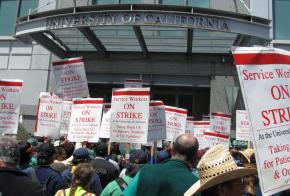Lessons from the picket line
A five-day strike by 8,500 service workers in the University of California system--in defiance of a judge's temporary restraining order--ended July 18 with workers even more determined to continue their fight for a decent contract.
, a groundskeeper at UC-Berkeley and member of the bargaining committee for AFSCME Local 3299, describes the impact of the strike.
IT WAS Monday, July 21, my first day back at work after being on strike for five days. As I stood at the sink in one of the bathrooms on campus, I looked at the counter and thought, "Wow, this place is filthy."
I turned to the trash can in the corner, buried under a mountain of paper towels, and a grin spread wide across my face: I had met the underpaid custodian for this building on the picket line last week.
If a strike's success is judged only by how quickly management gives in, then it's too early to call. In fact, I spent a lot of time last week explaining to folks that management would probably not want to teach us that striking works. So even though management is feeling the pressure brought on by a week of striking, bad press for them and activated state legislators, it may take a while before we see an offer that's good enough to bring us back to the bargaining table.
But other measures show that this was a powerful action. The temporary restraining order that UC management won against the walkout only made the thousands of us who struck anyway even more defiant and united.

We all learned more deeply what standing together could do, and that we can do more than we thought. University administrators have now said that they will not discipline anyone--as they had threatened to do--for striking.
People living paycheck to paycheck had to stretch themselves to go out on strike, and it's hard to be on a picket line for eight hours a day for five days. But UC management practically forced us out on strike. We are angry knowing that, while UC management is doing a $9 million rehab on the president's mansion, the university spends as much on one month's rent on his temporary home as a custodian takes home in a year.
But there is buoyancy that comes with fighting back against what holds you down, and that made the strike feel like a festival at times. We had rallies every day to address concerns (like threatened discipline), raise spirits and talk about what the strike means.
At the Wednesday rally (an ecumenical faith service, actually) in front of the UC office of the president, I had a chance to list off the reasons why we were on that sidewalk.
We were there to hold back the rising costs of parking and health care. We were there for ourselves, for the respect that comes with better wages. We were there for our families--not just to put food on the dinner tables, but to be at the dinner table and a part of our children's lives, instead of working two jobs just to get by. We were standing up for workers across the country who, in a land of rising gas and milk prices and home foreclosures, are experiencing what we're going through, while executives like the new UC president continue to make bigger piles of money at our expense.
Folks really started shouting at this point. I concluded that this is a land of plenty, and that there is plenty at the University of California, and it's time that we took back some of what is ours. The crowd erupted. This is where hard-hit workers are at these days.
In terms of where the level of struggle in this country needs to be, last week's strike is small. But it is an important contribution in terms of showing that workers want to--and can--fight back.


